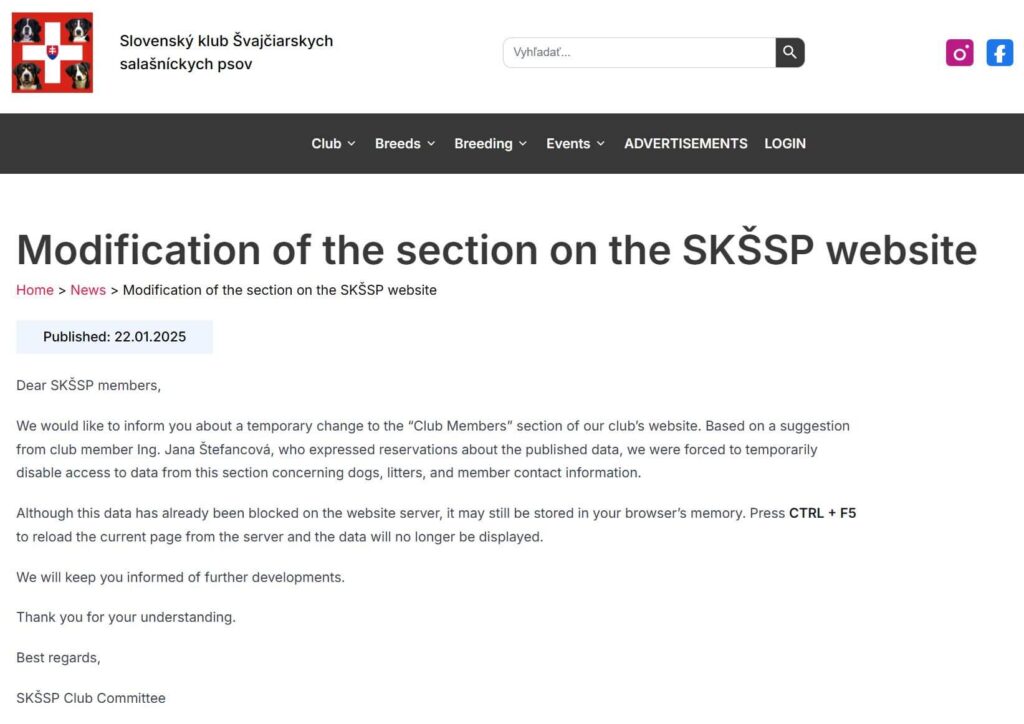Transparency with a Password
Until recently, anyone — a future puppy buyer, a journalist, or a breeder — could visit the Slovak Club of Swiss Mountain Dogs (SKSSP) website and see how dogs were bred in Slovakia: who bred them, how many litters they had, their pedigrees, and the ages of their breeding stock.
It was standard practice — part of the transparency that underpins trust in the breeding system.
But everything changed on January 22, 2025.

source: skssp.eu
An official announcement appeared on the SKSSP website stating that the “Members” section was temporarily restricted — following a request from club member Ing. Jana Stefancova, who objected to the publication of information about her own kennel.
Publicly available data also show that Stefancova is listed as the owner of Balihara Ranch Kennel, as she states on her social media profile.
Today we know that “temporary” turned out to mean permanent: the data still exist, but are now accessible only within a password-protected members-only section — available only to a small circle of members.
The public — which once could verify and cross-check the information — has now lost access.
The Factual Dimension – What Changed and Why It Matters
The club’s official statement was unambiguous:
“Based on a request from club member Ing. Jana Štefancová, who expressed objections to the published data, we were forced to temporarily restrict access to this section containing information about dogs, litters, and members’ contact details.”
After this decision:
- the public database of breeders and litters was removed,
- the exact same data remained preserved inside the members’ area,
- new puppy buyers or independent observers can no longer access it.
The data did not disappear — they were simply moved behind a password.
While members can still see everything, ordinary owners, potential buyers, and journalists cannot.
This marks a significant shift, because according to the FCI and the Slovak Cynological Union, public access to breeding data is a cornerstone of transparency and ethical breeding.
This new “two-tier web” model — one public, one internal — appeared only a few months after our website published detailed analyses of Balihara Ranch, using data drawn directly from that formerly public database.
The Investigative Dimension – When Facts Become Inconvenient
Information about the breeding practices of Stefancova was among the data featured in our analytical reports.
Our articles documented how frequently litters were produced, how quickly they followed one another, and compared figures on litter counts, the ages of dams, and the frequency of matings under the management of Balihara Ranch — based purely on numbers.
But the facts began to speak for themselves.
Suddenly there was a “complaint.” Suddenly there was talk of “privacy protection.”
The club’s board responded broadly — by blocking access for everyone.
It remains unclear what kind of pressure Stefancova exerted, but the speed of the board’s reaction suggests the matter went far beyond a simple email.
Available information indicates that the decision was made without a vote by the general membership.
The Emotional Dimension – Silence That Suffocates Fairness
Silence has become a form of defense.
Not against attack — but against truth.
Some breeders feel betrayed.
They do their work honestly, follow the rules, make their data public — and yet, they have lost the ability to demonstrate their transparency.
Those who have nothing to hide are paying the price for those who feared that facts might speak too clearly.
Transparency is not an attack.
It is a mirror — and some people simply don’t like what they see in their own reflection.
Transparency for the Chosen Few
Transparency that is accessible only to a small circle of insiders stops being transparency at all.
The official reasoning — personal data protection, GDPR — would make sense only if the information in question were private.
But breeding data — litters, parents, dates, owners of breeding stock — are not private data. They are part of the official FCI registry, meant to be available to anyone who wishes to verify the origins and ethical standards of a kennel.
By taking this step, the SKSSP has:
- stripped the public of its right to scrutiny,
- disadvantaged ethical breeders who have nothing to hide and would gladly display clean records,
- and created a dangerous precedent — that public facts can be silenced under the pretext of “privacy.”
Longtime club members who have always worked with open records now speak of a “return to darkness.”
“It’s not just about one breeder,” said an anonymous club source.
“It’s about the fact that a single voice was enough to silence data meant to serve everyone.”
When a Club Closes Its Eyes, the Public Should Open Theirs
The data did not disappear — they were merely moved behind closed doors.
For some, that brings comfort.
For others — a loss of oversight, trust, and fairness.
A system that fears its own data forfeits credibility.
And when a breeders’ club shuts its eyes to the public, the public should open theirs even wider.
If a single voice can close access to hundreds of thousands of people, this is no longer a transparent organization — but a system that protects silence instead of truth.